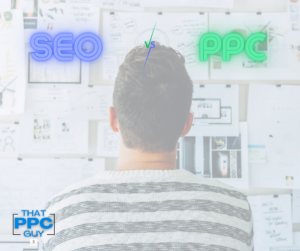
Digital Marketers have long debated which is better, PPC, or SEO?
If you’re running an online business, you’ve probably heard of both pay-per-click (PPC) advertising and search engine optimization (SEO) as ways to drive traffic to your website. While both approaches are geared towards increasing visibility for your website, they operate on different principles and can have different outcomes. In this blog post, we’ll explore the key differences between PPC advertising and SEO, and help you decide which approach might be right for your business.
PPC advertising is a model in which advertisers pay for each click on an ad that directs visitors to their website. The most common example of PPC advertising is Google Ads, where businesses bid on certain keywords to have their ad displayed at the top of the search results page when someone searches for those keywords. The cost per click (CPC) of each ad depends on the competition for the keyword and the quality score of the ad, which is determined by its relevance and landing page experience.
On the other hand, SEO refers to the process of optimizing your website to rank higher in organic search results. This involves a range of activities such as keyword research, on-page optimization, link building, and content creation, all aimed at making your website more relevant and authoritative for certain search terms. Unlike PPC advertising, SEO doesn’t involve paying for clicks, but it can be a long-term investment that yields sustainable traffic and leads over time.
So, what are the main differences between PPC advertising and SEO?
Cost structure: PPC advertising involves paying for each click on your ad, while SEO doesn’t require a direct monetary investment. However, SEO may involve hiring an agency or dedicating resources to optimize your website, which can have indirect costs.
Speed of results: PPC advertising can drive immediate traffic to your website as soon as you launch your campaign, while SEO can take time to show results, as it involves building authority and relevance over time.
Placement on search results page: PPC ads are displayed at the top of the search results page, above the organic results, while SEO aims to rank your website higher in organic search results.
Click-through rates: While PPC ads have a higher click-through rate (CTR) than organic results, users are becoming increasingly aware of ads and may skip them in favor of organic results, which are perceived as more trustworthy and relevant.
Targeting options: PPC advertising allows for precise targeting based on keywords, location, demographics, and other criteria, while SEO may be limited by the search terms and topics that you’re trying to rank for.
So, which approach is better for your business? The answer depends on your specific goals, budget, and timeline. PPC advertising can be a good choice if you’re looking for immediate traffic and leads, have a specific promotion or event, or want to test different messages and offers. SEO, on the other hand, can be a more sustainable approach that builds your brand and authority over time, and can generate organic traffic and leads without ongoing ad spend.
Ultimately, the best strategy may be a combination of both PPC advertising and SEO, depending on your business needs and resources. By leveraging the strengths of each approach, you can maximize your online visibility and reach your target audience effectively. More articles can be found HERE #ppc #seo #googleads #sem